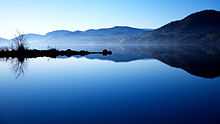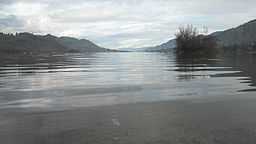Skaha Lake
Skaha Lake, historically known as Dog Lake and originally Lac Du Chien, is a freshwater lake located along the course of the Okanagan River in the Okanagan Valley of British Columbia, Canada.[1][2] It has a surface area of approximately 20 km², with a maximum depth of 55 metres. The lake is situated directly south of Okanagan Lake and forms the southern shoreline and boundary of the city of Penticton, British Columbia. The community of Okanagan Falls is located at its southern end, the community of Kaleden lies in the upland area to its west.
History and meaning of name
"Labelled "L. du Chien" (Dog Lake) on Anderson Map, 1867; labelled "Du Chien L." on Trutch maps, 1866 and 1871. Origin unknown. Later, Dog became the official name. Changed in 1930 to Skaha "to agree with the local name," states the Chief Geographer. However Okanagan Indians say "skaha" is not their word for dog, but is that of the Shuswaps, and that the local word for dog is chokowapee. (Parham, 40). Another spelling is kaekuwapa. The local meaning of skaha is "horse". (Albert Millar). That is also the meaning in the Nicola dialect. (W. G. Clapperton)." [3]
Images
 |
Wikimedia Commons has media related to Lake Skaha. |
-
Lake Skaha from Christie Memorial Park
-
Skaha Lake along the Okanogan River
-
Northern end of Lake Skaha on a winter afternoon
See also
References
- Anonymous (1974a). Limnology of the Major Lakes in the Okanagan Basin. Canada - British Columbia Okanagan Basin Agreement, Final Report, Technical Supplement V. British Columbia Water Resources Service, Victoria, British Columbia, 261 pp.
- Anonymous (1974b). The Main Report of the Consultative Board. Canada - British Columbia Okanagan Basin Agreement. British Columbia Water Resources Service, Victoria, British Columbia.
- Stockner, J.G. and Northcote, T.G. (1974). Recent limnological studies of Okanagan Basin lakes and their contribution to comprehensive water resource planning. Journal of the Fisheries Research Board of Canada, 31, 955-976.




